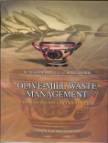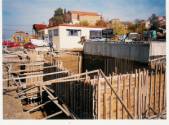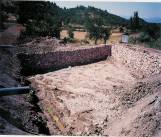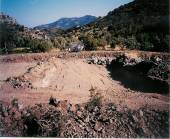|
NAIAS PROGRAMME - ACTION 7.6
INNOVATIVE
OLIVE MILL WASTEWATER MANAGEMENT SYSTEMS
-
First Results -
The purpose of this Action was to select integrated olive mill wastewater
management systems and to set up pilot plants on a
number of olive-mills in the North Aegean Region. At
present, construction of three of these pilot waste
management systems is now complete or well in progress
in three olive mills in the North Aegean Region will be
fully operational by the next olive-harvesting season.
The research work and findings are expected to serve
as a valuable source of information for the local government
policy makers (Prefecture) in their effort to lay down
regulations and guidelines regarding the disposal of
olive mill wastewater that will effect every olive mill
in the Region of North Aegean (Prefectures of Lesvos,
Chios and Samos).
The most significant phases of Action 7.6 are summarised below. First,
all olive-mills in the North Aegean Region were
registered and detailed technical and environmental
information on all of the above olive mills was used to
produced a specialised data base. Based on this data,
risk assessment was conducted for each particular olive
mill. In parallel, a bibliographical data base
containing references to scientific papers, books and
patents relating to olive mill waste management was
developed and a book entitled
“Olive Mill Waste
Management: Literature Review and Patent Survey was
published by M. Niaounakis and C.P. Halvadakis.


Several
meetings were organized on Lesvos, Chios and Samos to
inform olive mill owners about the benefits of
participating in the Programme.


After
conducting numerous interviews and visits to the sites,
which were candidates for the construction of pilot
plants, nine preliminary studies of innovative olive
mill wastewater management systems were drawn up. In
particular, preliminary wastewater management systems
studies were drawn up for the Agricultural Cooperative
olive mills of Anemotia, Kleou, Plagia villages on
Lesvos island as well as the Privately Owned Olive Mills
of Giannakas (Afalonas), Kantaris (Vasilika), Kantzanos
(Kato Tritos), Kokkinoforos (Moria) on Lesvos and
Xenakis (Chios island). Moreover, in response to demand
of Chios
Island 0live mill owners, a preliminary report
studying the integrated management of olive mill
wastewater on Chios Island was compiled. The financial
situation of several olive mills and /or certain
technical aspects did not permit the construction of
innovative pilot plants in all of the above olive mills.
The olive mills that finally signed the Innovative
Action Allowance Agreement, as well as the budget of
each project are listed below:
Ψ
“Construction and
operation of an olive mill wastewater management system
at Th. Giannakas olive mill, Afalonas, Lesvos island”.
Project Budget = 75.562,00 €.
Ψ
“Construction
and operation of olive mill wastewater management system
at P. Kantaris olive mill, Vasilika, Lesvos island”.
Project Budget = 138.300,00 €.
Ψ
“Construction
and operation of olive mill wastewater management system
at the Anemotia Agricultural Cooperative olive mill,
Anemotia, Lesvos island”. Project Budget =
126.000,00 €.
The olive mill wastewater management system that was finally proposed was
selected after extensive literature review and was
optimized by conducting laboratory experiments. The
above system combines operational simplicity, financial
viability and social acceptance. The central part of
this system is a Phase Separation Tank (PST), where
wastewater remains for five days, separating into three
fractions by natural settling.


Phase
Separation Tank (Vasilika, Lesvos)
The light fraction (floating grease and oils) is periodically removed
from the PST and returns to the olive mill to obtain a
low quality industrial olive oil. The middle fraction is
applied to the land (subsoil infiltration field or
evaporation ponds), whereas the heavy fraction (settled
sludge) is periodically removed and disposed of in deep
anaerobic pits. The above described wastewater
management system was approved by the Department of the
Environment (Local Authority of Lesvos (Prefecture)
which granted a operating permits
to the olive mills participating in the Action
7.6 Programme.


Evaporation – Infiltration Ponds (Vasilika, Lesvos)


Subsoil
Infiltration Field (Anemotia
Lesvos)
It should be noted that Action 7.6 of the NAIAS Programme, as well as the
proposed wastewater management system, are already known
in foreign countries through the Action 7.6 website and
several olive-oil producing countries such as Morocco
and Tunisia have expressed their interest in visiting
the pilot plants. The conclusions of Action 7.6 were
recently presented at the “Olive mill wastewater
management” scientific conference organized by the
National Technical Univesity of Athens, while they will
be submitted for publication in international scientific
journals.
Detailed
information
on the pilot plants / management system application of NAIAS Action-7.6
(includes photographs from the construction sites)
|















